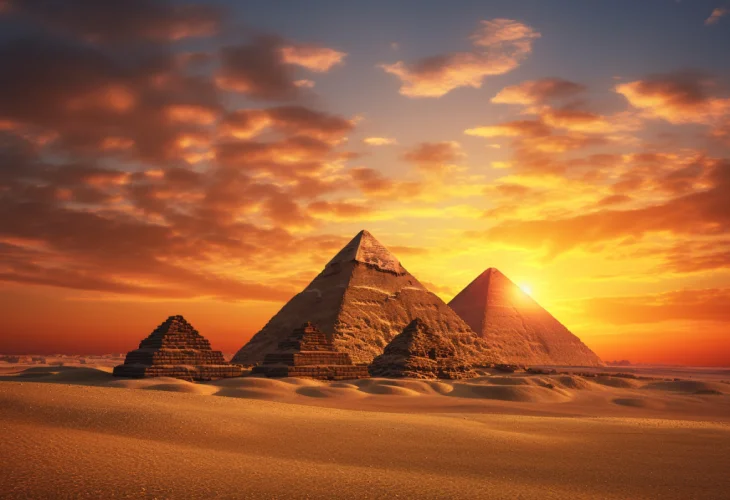History and Archaeology
Did the Israelites Build the Pyramids? Myth, Politics, and the Battle Over Biblical Archaeology
The debate over the pyramids reveals more about modern denial and ideology than about ancient Egypt itself

Although illustrations in Passover Haggadot often depict Egyptian taskmasters standing in the shadow of the pyramids, whip in hand, many modern historians confidently dismiss this as a myth, insisting it’s time to “slay sacred cows.”
The tradition that the Israelites built the pyramids appears already in the writings of Josephus Flavius, the first-century Jewish historian. Josephus describes the Israelites as the builders of the great monuments of Egypt — the pyramids, which in his time were already world-famous and counted among the Seven Wonders of the Ancient World.
The Historical Timeline
According to most modern archaeologists, the famous pyramids of Giza were built long before the biblical period of Israelite slavery in Egypt. However, that fact doesn’t completely disprove the traditional narrative.
Egyptologists note that pyramid construction continued for hundreds of years, evolving with Egypt’s political and economic shifts.
Different dynasties built pyramids using different methods, depending on the pharaoh’s wealth, the engineers’ abilities, and the available resources.
Today, about 120 pyramids have been identified in Egypt, but evidence suggests that many more once existed — some destroyed, others still buried beneath desert sands, waiting to be uncovered.
Enter Zahi Hawass — Egypt’s “Guardian of Antiquities”
The man most responsible for “debunking” the idea that the Israelites built the pyramids is Dr. Zahi Hawass, who served for decades as the Secretary-General of Egypt’s Supreme Council of Antiquities. Since 1969, he has been Egypt’s most powerful archaeological official — and a figure well-known for his anti-Israel bias.
Although Islamic tradition itself acknowledges the Torah as a divine text, many Muslim archaeologists and scholars have systematically denied any connection between the Jewish people and the archaeological record of the region.
Hawass has consistently downplayed or erased any evidence that might hint at Israelite presence in ancient Egypt or the biblical narrative.
His main argument against the “Israelite slave” theory is that spacious homes have been found near the pyramids — supposedly proving that the builders were well-treated Egyptian workers, rather than slaves. This interpretation conveniently ignores the reality that every major construction project also requires overseers and engineers. Those large houses likely belonged to taskmasters, like those described in the Torah, who lived comfortably while the enslaved laborers toiled and died in misery.
Politics of Archaeology: Erasing the Past
This selective rewriting of history is not limited to Egypt. In Beirut (1994), massive excavations unearthed temples, tombs, and inscriptions dating back thousands of years. Yet the discoveries were bulldozed into the sea — archaeologist Albert Naccache later wrote bluntly: “They were afraid to find something Phoenician instead of Arab.” In much of the Arab world, archaeology is rewritten just like history — anything that challenges the Arab or Islamic narrative is destroyed or dismissed.
The same has happened on the Temple Mount in Jerusalem, where Muslim authorities have carried out systematic destruction of ancient remains that could testify to the existence of the Jewish Temple.
The Case of Ebla — and the “Biblical Taboo”
A similar controversy erupted in the 1970s, when Italian archaeologist Giovanni Pettinato discovered the ruins of ancient Ebla (modern-day Tell Mardikh, Syria). Among the clay tablets he found were names like “Abraham,” “Sodom,” and “Gomorrah.”
His findings triggered outrage in the Arab academic world. The Syrian newspaper Tishreen published an interview with Dr. Afif Bahnassi, who claimed the biblical connections were “Zionist fabrications.” As Biblical Archaeology Review reported in March 1979, “It is clear that through anti-Zionist political pressure, Syrian officials are trying to influence the scientific interpretation of the Ebla tablets.”
Between Myth and Memory
Whether or not the Israelites built the pyramids, the pattern of denial tells its own story — not about archaeology, but about politics, identity, and the fear of biblical validation.
Archaeology may yet uncover evidence buried beneath the sands, but ideological bulldozers often erase it first. Perhaps the Haggadah’s illustrations — Israelites building under the burning Egyptian sun — still hold a truth deeper than historical timelines:
A truth about oppression, endurance, and the human struggle for faith and freedom.

